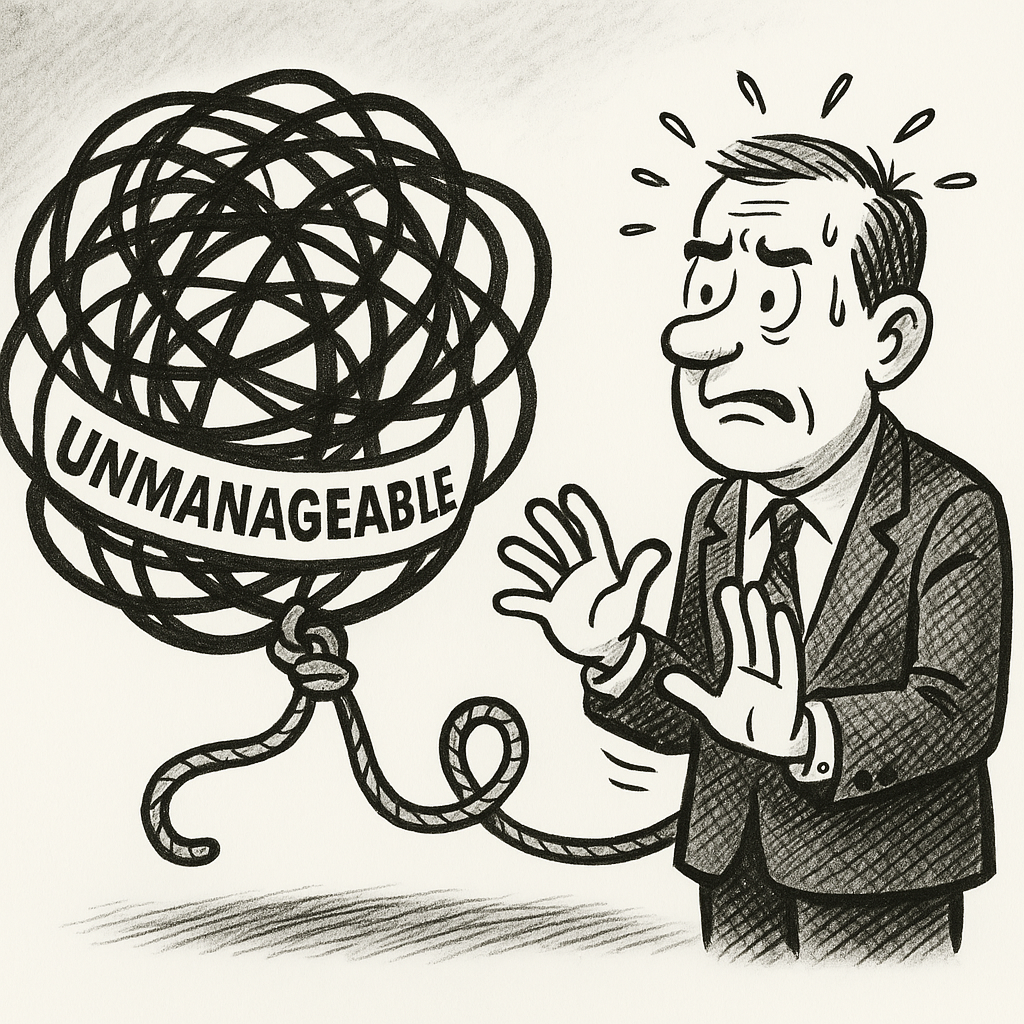The next two Blog posts I will submit are a piece of ancient history. They are two articles I wrote for the Air Force Comptroller magazine. The first is from 1985. The second is 1987. I was at the peak of my Air Force career as Comptroller of a major Air Force command.
I wrote the article cause I thought I had learned a bunch about leadership and management in my prior 25+ years of being an Air Force officer. My other motivation was that financial management articles can be flat ass boring. I thought I could make mine somewhat entertaining. I guess I sorta succeeded, cause I was honored to receive the Article of the Year award from my peers in both 1985 and 1987.
Each article is a list of 10 management truisms. (not to be confused with Scoolerisms).
I’ve already committed the ” crime” of redundancy, so let’s get on with the posting. As always, thanks for paying attention. Questions? Comments?
How to Manage the Unmanageable
By Col Donald Scooler
Comptrollers are managers-some are good, some not so good. Regardless of management ability, comptrollers at all levels are constantly required to perform the typical management tasks (planning, organizing, directing, and controlling if you’re a classical management theorist; or getting things done through people, in a much more general sense). Over my twenty-three years in the Air Force, I have worked for managers of varied styles-some have been strong, some not so strong; but I’ve learned from each of them. In some cases, how to manage; in others, how not to manage. I have also practiced management over several of these years and have probably made about every mistake possible, interspersed perhaps with some successes. Hopefully, I’ve learned something from my years of experience and past errors. In this article I would like to share with you ten management truisms (at least for me they are truisms) and a conclusion. You may agree with some, all, or none of them. In fact, I find some of them apparently contradictory and certainly not foolproof. However, I have used them most frequently to preserve my sanity (and absolutely superior disposition) in a world of persistently more difficult management challenges. These challenges include declining resources and manning, increased tasking with increased complexity and recently, a data automation explosion in terms of minicomputers that can boggle one’s mind. My only real goal is that you will find them thought provoking, interesting, and maybe you will smile at their relevance to experiences in your career. The following are Scooler’s glittering management truisms.
The primary function of management is to remove burdens from the real experts.
Managers must provide a work environment conducive to productivity. Some burdens the manager must remove include poor facilities, excessive interruptions, and insufficient training for his people. Not quite as obvious is that the manager should act as a buffer between his “experts” and higher management/authority and not over-react to each whim or “what if”‘ from above. “Tis a real skill to be responsive to higher management while keeping your people on track with the mission. Of course, the main issue here is that you must not become your people’s biggest burden. Instead, provide clear guidance, parameters and timetables, and stand back and let your experts perform. Obviously, occasional progress checks and readjustments are essential but give your people some space.
There is no substitute for caring.
Lincoln spoke about fooling people some but not all of the time. What is essential here is really caring for your people and demonstrating that care by specific action. This is translated into recognizing superior performance with awards and other forms of appreciation, but most of all with career progression and promotion. Equally important to pushing your winners is to beware of “turkeys.” Mediocre or inferior performance also deserves recognition by non-promotion, non-progress, and realistic performance evaluations. Praising or rewarding mediocre performers with the same zeal as your winners dilutes the truly deserved recognition due superior performers. In the meantime, you, as a manager, have a duty to provide every opportunity to all your people to progress into the superior performer category.
Maturity is the ability to live with imperfection.
There are no perfect spouses, houses, assignments, bosses, locations, etc. They just don’t exist. Looking for perfection usually leads to disappointment, disillusionment, constant job changes, and other traumas. In short-minimize big mistakes, learn by small ones, and do the best with what you have. Remember “Zero Defects,” the Air Force program which essentially told us to remove erasers from pencils and to expect perfect performance the first time? Although this author does not agree with that concept, I also wish to point out the inherent danger of carrying my truism to the extreme which says, “Expect nothing and you’ll never be disappointed.” Not a chance-as a manager we must demand, encourage, and motivate superior performance. Expecting perfection, however, will only serve to frustrate your people and yourself. Excellence, on the other hand, should be our constant goal.
Trust is a two-way street.
We expect our people to trust and believe us; therefore, we must, at least until proven otherwise, believe and trust them. My favorite story to exemplify this truism occurred several years ago at a staff meeting I attended. I’ve modified actual verbage a bit but you’ll get the point. A fellow division chief told our director that he needed to work his people overtime the up-coming weekend. The director asked, How do you know you need overtime? The division chief replied, My people told me so. Director: How do you know your people aren’t lying to you? I won’t state the division chief’s response here, but I will summarize by stating that the director in this case was one from who I learned how not to manage. The moral is to trust your people. They will fail now and then, but the risk is worth it. If your people know you are depending on them, they will strive to live up to your expectations. Obviously, this like the other truisms, cannot be carried to the extreme which, in this case, is gullibility.
Whatever the boss is watching will improve.
Does this contradict the prior truisms? Probably. But management is sometimes contradictory, always situational, and never static. When management information points to a specific problem area, focus on it. Measure progress and let your people know you are watching it. Generally, the area will improve but don’t be fooled that there won’t be a trade- off. Your people will fix what you’re watching and most likely some other area will get less emphasis. In order to make this method work you need a good management information system with reasonable standards and good management indicators.
Flexibility is the key to air power.
Stay loose, the only thing I can promise you in management is uncertainty. When you develop a plan, the only certainty is that you will deviate from it at least slightly. I have always looked upon the constant requirement to alter course as job security. Perhaps that’s the old navigator in me. If we had total predictability, we certainly wouldn’t need managers. The successful manager not only needs to maintain his own sense of humor and cool wits, but in his role as buffer, he needs also to ensure his people don’t become demotivated by the constancy of change.
An ounce of cooperation is worth a pound of competition.
I’m sure there will be some who will disagree with me on this premise. In the U.S. we almost have a fetish about competition-from nursery school to little league to big business, we implant the idea that competition lends to improved productivity and success. In many areas this is very true. However, intra group competition in your office degrades your efforts to have the office work together as a team. Most studies will support the premise that intra group competition reduces the cohesiveness of that group and is dysfunctional to productivity. As a manager of people working in the same area, you will normally find a cooperative, teamwork atmosphere will lead to improved productivity, innovation, and initiative. Now, here comes the contradiction (or apparent contradiction): Inter group competition can be a very effective management device and will help foster teamwork in any given office. In the comptroller field, the MAJCOM and Air Force awards and recognition programs do a great job of focusing interests of accounting and finance, budget, management analysis officers as well as individual comptrollers on the idea of being number one in the command or Air Force. This kind of competition motivates and promotes cohesiveness within each individual office.
We have met the bureaucracy, and it is us.
We are “they!” —That is, the “they” we used to blame (and maybe still do) by saying they say I have to do it this way of they say we can’t do this. If you are a manager at any level, you are “they” to someone. We also must face the fact the Air Force is a giant bureaucracy contained in an even bigger bureaucracy (DOD) contained in a mammoth bureaucracy (the Federal Government). To be a successful manager you must understand your environment, which is highly bureaucratic. I have found that working within the rules of your particular bureaucracy may be a slow, painstaking process at times, but you will eventually accomplish more working with it than by purposely fighting it. There are power bases in the bureaucracy at all levels and without their support chances of success are minimal. Two examples come immediately to mind-one directly involves our career field. President Reagan directed the federal agencies to develop a flat rate per diem system to simplify travel reimbursements in 1980. Today, we in the Air Force have only succeeded in implementing the current flat rate test-five years after an Executive Order by the President, the bureaucracy remains supreme. I have also witnessed several occasions when unpopular general officer decisions are treated with benign neglect by middle managers and essentially ignored until the next change of command. Even the mightiest of leaders usually succeed by working with the bureaucracy rather than
There are no geniuses.
If a problem appears difficult when it comes across your desk, relax. It is probably even more difficult than it seems. When you give it to your experts (not geniuses) to solve, it is almost certain they will find it difficult too. Don’t expect surprising, immediate solutions to complex, long-term problems. Complex problem solving is an iterative process and you can only hope to chip away at the problem and provide reasonable recommendations to “satisfice” the problem rather than solve it completely.
You don’t get more with less; you get less with less.
The fact is, as resources and manning are reduced, postponable functions are neglected. In accounting and finance, for example, customer service will probably stay at a high level throughout numerous manning reductions because of its obvious visibility and the “can do” attitude of our people. What is lost is quality assurance and training which will eventually lead to long-term problems. As any comptroller should know, “There is no free lunch.” One possible contradiction to this truism lies with the automation explosion. There is no doubt that as we automate functions, manning can be eventually reduced without adverse impact. Of course, increased productivity through training our people to use automation effectively and the possibilities of shared data bases and computer networking are the waves of the future, which I totally support. Computers and training and all the systems experimentation we will do before we settle on the right system bear a pretty high resource cost too. This cost must be borne if the job is to be done effectively and efficiently.
Conclusion
In the beginning of this article, I said I would have ten truisms and a conclusion. The purpose for writing this article was to provide you with some food for thought and insights gathered over several years in several different management roles. Although I said all management was situational and those ten truisms may sometimes contradict themselves, I have found one consistent key to successful management and productivity and that is-communication. Whatever the management style, the manager who can clearly communicate verbally and in writing is almost sure to succeed. If your people understand your guidance, they will make every attempt to follow it. However, the existence of foolproof communication which involves transmitter, network and receiver, all working on the same wave length, is rare indeed. Regardless of the plethora of education we provide our people and ourselves on effective communication in technical training as well as PME, we tend to come back to the office and practice the antithesis of it. This is one area we all need to continually improve. In the meantime, hang in there and enjoy the challenge.
Col Scooler is Assistant Deputy Chief of Staff, Comptroller. at Headquarters Military Airlift Command, Scott AFB, IL. He was commissioned in the U.S. Air Force in 1961 through AFROTC. He earned a Master of Business Administration degree from the Ohio State University (AFIT). He is a graduate of SOS, ACSC. ICAF, AWC, Army War College in residence, and PMCS. Prior to his present position, Col Scooler, was MAC’s Director of Accounting and Finance. Col Scooler is a member of the ASMC and president-elect of the Shiloh Valley Chapter



Handsome picture Don. Impressive credentials!
Thanks Fran. It’s amazing what a uniform and getting rid of 40 years can do. Lol.